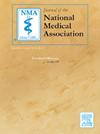Managing Diabetic Distress in African Americans with Type 2 Diabetes
IF 2.3
4区 医学
Q1 MEDICINE, GENERAL & INTERNAL
引用次数: 0
Abstract
Introduction
Diabetic distress—a specific emotional burden stemming from the daily challenges of managing type 2 diabetes—has emerged as a critical factor affecting patient outcomes. African Americans, who experience disproportionate rates of type 2 diabetes and related complications, often encounter unique socio-economic and systemic barriers that exacerbate this distress. This abstract synthesizes a systematic review of studies published over the past five years to assess the prevalence, clinical impact, and intervention strategies for diabetic distress among African American patients, emphasizing practical applications for healthcare professionals.
Methods
A comprehensive literature search was conducted across major databases including PubMed, ClinicalKey, and PsycInfo. The review focused on studies that explicitly evaluated diabetic distress in African American populations with type 2 diabetes. Keywords such as “diabetes,” “type 2 diabetes mellitus,” “diabetic distress,” “African Americans,” and “health outcomes” were used to identify relevant articles. Fifteen studies meeting the inclusion criteria were analyzed for assessment tools (e.g., the Diabetes Distress Scale-17 and Problem Areas in Diabetes scale), intervention modalities, and their association with clinical outcomes such as glycemic control and self-management behaviors.
Results
The review revealed that diabetic distress is highly prevalent among African American patients with type 2 diabetes, with elevated distress levels correlating with poorer glycemic control, reduced self-efficacy, and lower adherence to treatment regimens. Interventions—including diabetes self-management education (DSME), cognitive-behavioral therapy (CBT), and culturally tailored peer support programs—demonstrated significant improvements. Patients participating in these interventions showed reductions in distress scores alongside meaningful decreases in HbA1c levels and other key health metrics. Notably, studies underscored interventions addressing cultural and socio-economic challenges yielded the most robust improvements in patient engagement and clinical outcomes, thereby highlighting their immediate practical application in clinical settings.
Conclusion
Addressing diabetic distress in African American patients is essential for optimizing diabetes management and mitigating health disparities. This review advocates for the integration of culturally sensitive, patient-centered interventions into routine diabetes care to enhance self-management and reduce adverse clinical outcomes. Future research with larger and more diverse cohorts is needed to standardize distress assessment tools and refine intervention strategies. Such efforts are vital to ensure safe patient care and promote health equity.
管理非裔美国人2型糖尿病患者的糖尿病困扰
糖尿病痛苦是一种特殊的情绪负担,源于管理2型糖尿病的日常挑战,已成为影响患者预后的关键因素。非裔美国人患2型糖尿病及相关并发症的比例不成比例,他们经常遇到独特的社会经济和系统性障碍,加剧了这种痛苦。本摘要综合了过去五年发表的研究的系统综述,以评估非裔美国患者糖尿病窘迫的患病率、临床影响和干预策略,强调了医疗保健专业人员的实际应用。方法对PubMed、ClinicalKey、PsycInfo等主要数据库进行综合文献检索。这篇综述的重点是明确评估非裔美国人2型糖尿病患者糖尿病痛苦的研究。使用“糖尿病”、“2型糖尿病”、“糖尿病窘迫”、“非裔美国人”和“健康结果”等关键词来识别相关文章。我们分析了符合纳入标准的15项研究的评估工具(如糖尿病困扰量表-17和糖尿病问题领域量表)、干预方式及其与临床结果(如血糖控制和自我管理行为)的关联。结果该综述显示,糖尿病焦虑在非裔美国2型糖尿病患者中非常普遍,焦虑水平升高与血糖控制较差、自我效能降低和对治疗方案的依从性较低相关。干预措施——包括糖尿病自我管理教育(DSME)、认知行为疗法(CBT)和有文化针对性的同伴支持计划——显示出显著的改善。参与这些干预措施的患者表现出痛苦评分的降低,同时HbA1c水平和其他关键健康指标也有显著下降。值得注意的是,研究强调了针对文化和社会经济挑战的干预措施在患者参与和临床结果方面产生了最有力的改善,从而突出了它们在临床环境中的直接实际应用。结论解决非裔美国患者的糖尿病困扰是优化糖尿病管理和减轻健康差异的关键。本综述提倡将文化敏感性、以患者为中心的干预措施纳入常规糖尿病护理,以增强自我管理,减少不良临床结果。未来的研究需要更大、更多样化的队列来标准化痛苦评估工具和完善干预策略。这些努力对于确保病人的安全护理和促进卫生公平至关重要。
本文章由计算机程序翻译,如有差异,请以英文原文为准。
求助全文
约1分钟内获得全文
求助全文
来源期刊
CiteScore
4.80
自引率
3.00%
发文量
139
审稿时长
98 days
期刊介绍:
Journal of the National Medical Association, the official journal of the National Medical Association, is a peer-reviewed publication whose purpose is to address medical care disparities of persons of African descent.
The Journal of the National Medical Association is focused on specialized clinical research activities related to the health problems of African Americans and other minority groups. Special emphasis is placed on the application of medical science to improve the healthcare of underserved populations both in the United States and abroad. The Journal has the following objectives: (1) to expand the base of original peer-reviewed literature and the quality of that research on the topic of minority health; (2) to provide greater dissemination of this research; (3) to offer appropriate and timely recognition of the significant contributions of physicians who serve these populations; and (4) to promote engagement by member and non-member physicians in the overall goals and objectives of the National Medical Association.

 求助内容:
求助内容: 应助结果提醒方式:
应助结果提醒方式:


